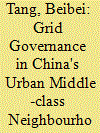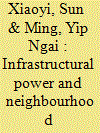|
|
|
Sort Order |
|
|
|
Items / Page
|
|
|
|
|
|
|
| Srl | Item |
| 1 |
ID:
173457


|
|
|
|
|
| Summary/Abstract |
This article examines the so-called “grid governance” scheme, a widely used grassroots governance strategy implemented in urban China in recent years. Drawing on data collected in multiple cities from 2011 to 2016, it analyses in what ways, and to what extent, the state employs the grid governance scheme to resolve neighbourhood conflicts and reinforce governance in Chinese urban middle-class neighbourhoods. The findings highlight complex interactions under the scheme among the residents, the state and market actors in neighbourhood governance, including the resident volunteers, residents’ social groups, residents’ committees and property management companies. By coopting middle-class resident volunteers, maximizing the existing political influence of the retired urban elites, and establishing Party organizations in middle-class residential communities, the grid governance scheme has become a major vehicle for resident mobilization and conflict resolution, and a key governance mechanism to reinforce the Party's leadership in middle-class neighbourhoods.
|
|
|
|
|
|
|
|
|
|
|
|
|
|
|
|
| 2 |
ID:
159560


|
|
|
|
|
| Summary/Abstract |
This article examines the capacity of China to adapt in the face of the political and social challenges brought about by economic reforms, and argues that the regime's resilience lies in the state's capacity to establish infrastructural power at the urban grass-roots level. The 1980s was an invaluable historical period, which witnessed the early stages of the economic reforms and the Chinese state experimenting with ways to adapt to the emerging challenges. As the danwei (work unit) system weakened, the state rebuilt the logistical infrastructure by means of handling burning issues, accumulating resources for expanding welfare coverage, facilitating residential-based grass-roots administrative networks, and consolidating its power through building institutional infrastructure for urban governance.
|
|
|
|
|
|
|
|
|
|
|
|
|
|
|
|
| 3 |
ID:
168021


|
|
|
|
|
| Summary/Abstract |
This article examines intermediary governance space in China’s urban neighbourhood governance. It identifies new local governance mechanisms and state-society relations through which urban and rural governance intertwine to interact with landless farmers during their introduction to and settlement in existing urban neighbourhoods. Through qualitative data collected in Suzhou, this study reveals the emergence of an intermediate governance space at the neighbourhood level, involving intermediary governance actors and organisations including agents of the Party-state, market groups, and social organisations. In the context of relocation communities, this article examines: how residents’ committees are put into place to carry out governance tasks; in what ways the land-losing farmers organise themselves and are mobilised to adjust to a new residential environment, and to what extent conflicts of interest are moderated within the neighbourhoods. The findings suggest dynamics of emerging intermediary governance space and actors in relocation communities. Performing as the liaison between the Party-state and the relocated villagers, the intermediary actors and organisations employ flexible practices and strategies in negotiating the relations between the state, the market, and the citizens produced through neighbourhood governance affairs.
|
|
|
|
|
|
|
|
|
|
|
|
|
|
|
|
|
|
|
|
|